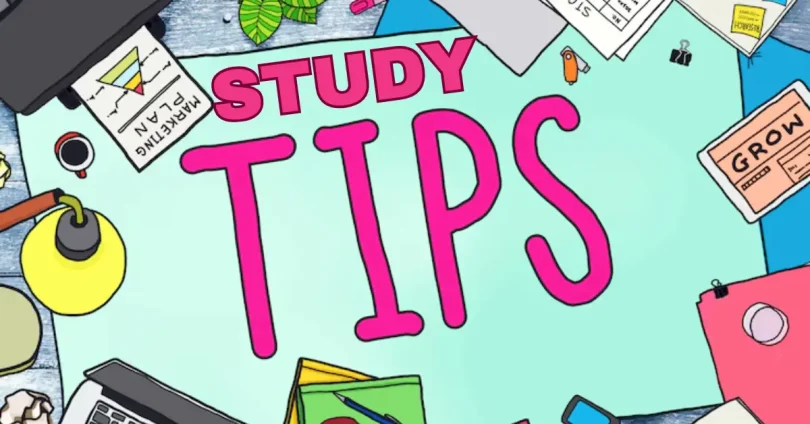Introduction:
Studying can be challenging, but with the right study tips, it becomes much easier and more effective. Whether you’re a school student, college learner, or preparing for exams, study tips help you stay organized, focused, and motivated. In this blog, we’ll explore the best study tips that can improve your learning and boost your academic performance. These tips are simple, practical, and easy to follow — perfect for anyone who wants to study smarter, not harder!
What is Study Tips?

Study tips are helpful strategies, methods, or techniques that make learning easier and more effective. These tips guide students on how to plan, organize, and manage their time and resources for better academic performance.
Study tips can include simple habits like:
- Creating a study schedule
- Taking regular breaks
- Using flashcards or notes
- Studying in a quiet place
- Practicing past papers
The goal of study tips is to help students understand and remember information better, stay motivated, and reduce stress while studying. Whether you’re preparing for school exams, college tests, or competitive exams, the right study tips can make a big difference in your success.
Why Are Study Tips Important?

Using the right study tips is very important for students of all ages. They help improve learning, save time, and reduce exam stress. Here’s why study tips matter:
Improve Focus and Concentration
- Helps avoid distractions during study time
- Keeps your mind on the topic
- Encourages active learning
Save Time and Study Smarter
- Teaches how to manage time wisely
- Avoids last-minute cramming
- Increases productivity with better planning
Enhance Understanding and Memory
- Makes it easier to understand difficult subjects
- Improves long-term memory with smart revision methods
- Helps retain key information through practice
Boost Academic Performance
- Leads to better test scores and grades
- Builds confidence in exams
- Helps in completing assignments and projects more effectively
Reduce Stress and Anxiety
- Reduces pressure during exams
- Makes students feel more prepared
- Supports mental well-being with organized routines
Step-by-Step Guide on Study Tips
Here is a simple and effective step-by-step guide on study tips to help you study smarter, not harder:
Step 1: Set Clear Study Goals
- Decide what you need to study
- Break large topics into smaller, manageable parts
- Write down your daily or weekly study targets
Step 2: Create a Study Schedule
- Choose the best time of day when you feel most focused
- Divide time for each subject or topic
- Include short breaks between study sessions
Step 3: Choose a Quiet and Comfortable Study Space
- Study in a clean, quiet, and well-lit area
- Keep your phone and distractions away
- Use a comfortable chair and table
Step 4: Use Smart Study Techniques
- Take notes in your own words
- Use diagrams, charts, or mind maps
- Try flashcards, practice quizzes, or teach the topic to someone else
Step 5: Review Regularly
- Don’t wait until the last minute
- Revise topics daily or weekly
- Practice with past papers and sample questions
Step 6: Take Care of Your Health
- Sleep 7–8 hours every night
- Eat healthy food and stay hydrated
- Take short breaks to relax and refresh your mind
Step 7: Stay Positive and Motivated
- Celebrate small achievements
- Avoid comparing yourself with others
- Stay confident and focused on your goals
Advantages and Disadvantages of Study Tips
| ADVANTAGES | DISADVANTAGES |
| Improve focus and concentration | May take time to build new habits |
| Help manage time effectively | Not every tip works for every student |
| Boost academic performance and grades | Some techniques may feel boring or repetitive |
| Reduce stress and exam anxiety | Requires self-discipline and consistency |
| Make learning easier and more organized | Too much planning can lead to overthinking |
| Encourage healthy study routines | Following too many tips at once can be overwhelming |
Common FAQs on Study Tips
What are the best study tips for students?
The best study tips include making a study schedule, taking regular breaks, using notes or flashcards, and revising regularly. Staying organized and setting clear goals also helps a lot.
How many hours should I study in a day?
It depends on your age, goals, and subjects. Usually, 2 to 4 focused hours a day is enough for most students. Quality matters more than the number of hours.
How can I stay focused while studying?
Choose a quiet place, keep your phone away, and take short breaks. You can also use techniques like the Pomodoro method (study for 25 minutes, break for 5).
What should I do if I get bored while studying?
Try changing your study method. Use videos, mind maps, or group study. Also, take short breaks to refresh your mind.
How can study tips help me during exams?
Study tips help you revise smartly, manage time, and stay calm. They make your preparation more effective and reduce last-minute stress.
Are study tips the same for every student?
No, each student learns differently. Try different tips and see what works best for you. The key is to stay consistent.
Can I use online tools for study tips?
Yes, there are many apps and websites that offer planners, flashcards, quizzes, and videos to make studying easier and fun.
Conclusion:
In conclusion, study tips play a key role in helping students of all levels succeed in their studies. They are not just random tricks — they are proven techniques that make learning more effective, organized, and stress-free. When you follow the right study tips, you are able to use your time wisely, understand concepts better, and prepare for exams with more confidence.
For example, creating a study schedule helps you manage your day and stay on track. Taking notes in your own words improves your memory. Regular revision keeps topics fresh in your mind. All these simple actions, when done consistently, lead to big results over time.
It’s also important to understand that every student is different. What works for one person might not work for another. That’s why it’s helpful to try different study tips and stick with the ones that suit your learning style the best.
Lastly, study tips not only help you do better in exams, but they also build good habits that can be useful throughout life — like time management, self-discipline, and staying focused on goals. So, start using smart study tips today, and enjoy a more productive, confident, and successful learning journey!
Bonus Points on Study Tips
Here are some extra bonus points to make your study routine even more effective:
- Use the Pomodoro Technique
Study for 25 minutes, then take a 5-minute break. After four rounds, take a longer break. This helps maintain focus and avoids burnout. - Teach What You Learn
Explaining a topic to someone else is one of the best ways to understand and remember it. - Stay Consistent, Not Perfect
Studying regularly is more effective than trying to study perfectly for long hours once in a while. - Limit Multitasking
Focus on one subject at a time. Multitasking reduces productivity and weakens memory. - Use Positive Self-Talk
Replace “I can’t do this” with “I will try my best.” A positive mindset improves performance. - Reward Yourself
After completing a study session, give yourself a small reward. This keeps you motivated. - Use Digital Tools Wisely
Apps like Notion, Quizlet, or Google Calendar can help you organize your study material and schedule. - Track Your Progress
Make a checklist of topics. Crossing off completed ones gives a sense of achievement and motivation







